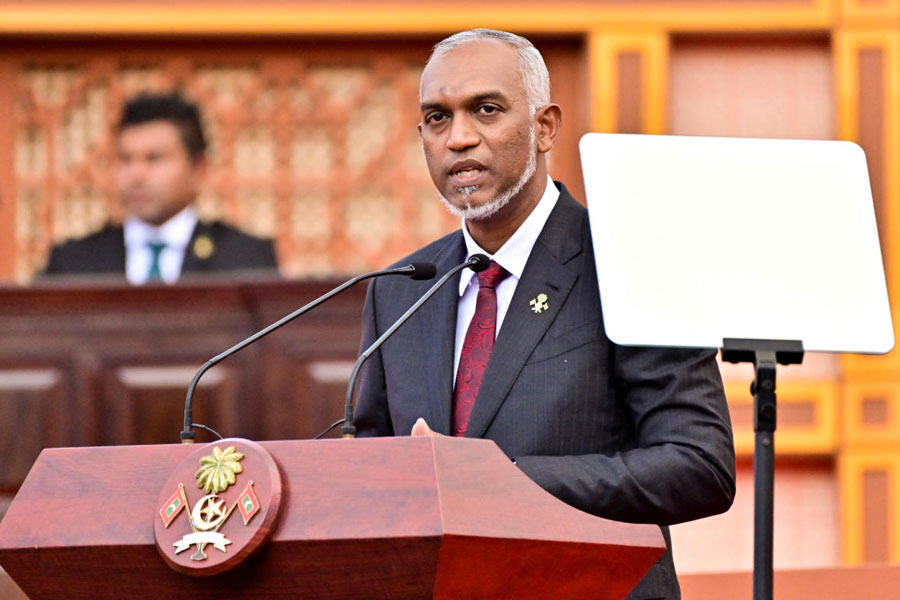Maldivian President Mohamed Muizzu on Monday elaborated on his government’s “India Out” policy in his maiden address to the country’s parliament, stressing his intent to terminate any agreement that might undermine the atoll nation’s sovereignty.
Without naming India, Muizzu said: “The support of a large majority of the Maldivian citizens for our government was the pledge to withdraw foreign military troops from the country, to recover the lost area of Maldivian territory, and to terminate any agreement made by the State that might undermine the country’s sovereignty.”
Muizzu’s first order of business after being sworn in as President in November was seeking the withdrawal of Indian military personnel from the Maldives.
He told the parliament, Majlis, on Monday: “Discussions with this foreign nation are under way through diplomatic channels. We have requested to withdraw the foreign military personnel in the Maldives. These discussions are still ongoing.
“As agreed in the latest negotiations, the military personnel in one of the three aviation platforms will be withdrawn before 10 March 2024. And the military personnel on the remaining two platforms will be withdrawn before 10 May 2024.”
Muizzu’s use of the words “withdraw” and “withdrawn” appeared curious. The Maldivian foreign ministry had on Thursday, in its read-out on the second meeting of the high-level core group between India and the Maldives, said that “both sides agreed that the Government of India will replace the military personnel in one of the three aviation platform(s) by 10 March 2024, and will complete replacing military personnel in the other two platforms by 10 May 2024”.
India worded it differently: “Both sides also agreed on a set of mutually workable solutions to enable continued operation of Indian aviation platforms that provide humanitarian and medvac services to the people of Maldives.”
On being quizzed about the wording used by the Maldivian side, Indian officials stuck to New Delhi’s version, raising the expectation of military personnel being replaced by civilians to operate the two helicopters and one Dornier gifted to the Maldives by the Manmohan Singh and Narendra Modi governments, respectively.
Muizzu said: “We have officially communicated that the Maldivian government will not renew the agreement which gives a foreign nation the power to measure and map the Maldivian oceans and coastlines. We will not give in to any pressure that can quiver the sovereign state of the country.”
He was referring to the MoU on cooperation in the field of hydrography, signed in June 2019 during Modi’s state visit to the Maldives during the tenure of Muizzu’s predecessor Ibrahim Solih.
Abhijit Singh, a senior fellow who heads the Maritime Policy Initiative at the Observer Research Foundation (ORF), said that marine information, like most other data, is agnostic and can be used for both civilian and military purposes.
“Experts say that the data that helps advance non-military objectives, such as ensuring navigational safety, marine scientific research, and environmental monitoring, also facilitates military aims like surveillance of a nation’s vital coastal installations and war-fighting assets,” Singh wrote in an article on the decision for the ORF.
Muizzu did not pick on any of the other projects in the Maldives that India is engaged in, not even the plan to develop a military port and dockyard in Uthuru Thila Falhu (UTF), which he had questioned when in opposition.
Nor did he mention the latest irritant in bilateral relations — the allegation that Indian Coast Guard troops boarded Maldivian fishing vessels in the archipelago’s economic zone.











